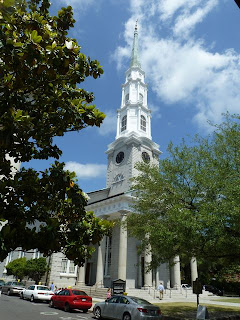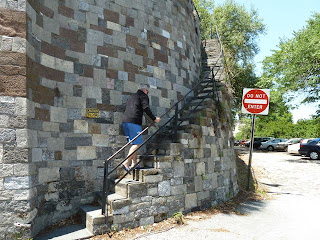Savannah, Georgia! Wow! Pete and I left Savannah with our heads spinning from history overload and the images of the amazing architecture in this unique scintillating city! We parked at the Tourist Welcome Centre on the edge of downtown and took the most interesting and fascination 90 minute trolley tour of the city - the guides commentary was excellent! Later we walked round the areas that most interested us - lovely strolling through the squares and under the canopies of the Live Oaks!
Savannah was founded in 1733 by British General James Oglethorpe and was Georgia's first city, so named by a British royal decree. The historic downtown is a treasure of amazing houses, buildings and city squares - 22 of them! (there were 24 but the city reclaimed 2 to build on) , all nestled beneath the beautiful Live Oak trees, hung with Spanish Moss (they are prolific throughout Georgia and South Carolina).
Just a note about these Live Oak trees - many of them are 100-200 years old minimum. They were popular trees to plant along drives or roads and it takes 100 years alone for them to form a canopy. The timber is strong as are the trees. Where the live oaks have matured to form an avenue with a canopy, the roots below have intertwined to add strength to the trees, thus they have withstood hurricanes over the years and still stand proudly today. These avenues are stunning and the spanish moss weeping from the branches adds an enchantment to their beauty.
Originally conceived as a buffer against Spanish- controlled Florida, Georgia served as a busting colonial outpost in its earliest days. With the help of the Native-American leader Tomochichi, General Oglethorpe founded America's thirteenth colony and created a modern city in the heart of the Georgian wilderness. Oglethorpe devised Savannah's distinctive city plan - an ingenious system of squares, which are really miniature public parks - that served as an organising system for the downtown area. In this grid-like model of urban planning, houses,churches and businesses surround each square, creating a network of interconnecting neighbourhoods. The squares also served a military function as well, serving as centralised places where citizens of the new colony could gather to defend the city. 22 of the city's original squares (24 of them) remain, each of which has its own charm, style and personality.
Cotton and rice where ideal for cultivation in the rich soil and warm climate. Large plantations appeared along the Savannah River, many of which used slaves imported from west Africa to harvest crops and build the infrastructure that made Savannah a prosperous city. Slaves passing through the local port created the area's Gullah culture, a group of people who descended directly from West African slaves and have preserved many of their linguistic, culinary and cultural traditions. The Gullah culture continues to thrive in communities in Georgia and South Carolina. Cotton contributed to Savannah's wealth and opulence in the early 19th century and magnificent homes and lavish plantations were constructed throughout the region as Georgia most genteel city enjoyed the finest luxuries from around the world.
Well done General Oglethorpe! Loved your city!
 |
| This bronze statue of General Oglethorpe faces south protecting Savannah from the Spanish in Florida to this day, Chippewa Square. |
 |
| The Old Pirates House Linked to Robert Louis Stevenson's "Treasure Island" |
 |
| Th smallest house in Savannah |
 |
| Independent Presbyterian Church |
 |
| Cathedral of St John the Baptist |
 |
| The dolphin drain pipe |
 |
| Owen-Thomas House |
 |
| Th City Markets. This is where the slave markets use to be. |
 |
| Avenues of Live Oaks hung with Spanish Moss |
 |
| Beautiful Squares |
 |
| Who sat on a bench here in a well known film? Hint - you might find chocolate papers on the ground? The movie makers removed the bench after filming. |
 |
| SS Savannah |
 |
| Click to enlarge |
 |
| River Street Cotton warehouses along the river are now quaint shops, boutiques, art galleries and restaurants |
 |
| Peter walking up the steps from the riverfront - these were once used by the factors |
 |
| Riverwalk scene along the Savannah River, the Talmadge Memorial Bridge in background |
 |
| A memorial to the slaves brought from West Africa |
 |
| Click to enlarge |
 |
| Click to enlarge |
 |
| Olympic Flame in Morrell Park Savannah was the site of the 1966 Olympic yachting events and the flame burned throughout th duration of the games in Atlanta |
Georgia and South Carolina were home to the huge Plantations that produced Rice, Indigo and Cotton to export to England and Europe. This made the plantation owners very rich and so the plantation homes were a reflection of their affluence. It was sad that they used slave labour from West Africa to work these plantations. Indigo is a plant that they used for the blue/purple dye and was in great demand in England.
Some of the plantations are preserves or refurbished today for tourism purposes but many have become golf courses and housing developments, or luxury golf/housing estates called Plantation Estates. Hence there are many, many beautiful golf course along the Georgia and South Carolina coastline. Pete was drooling over them!!!
Some other interesting things about Savannah:
* Juliette Gordon Low, the founder of the Girl Guide's, was born, married and lived in Savannah.
* Hollywood loves Savannah:
Savannah's Hollywood history began in 1915, with the filming of the silent movie "Under Southern Skies." Our first talkie (movie with sound), was "A View From Pompey's Head," starring Richard Egan, and filmed here in 1955. Not long after, in 1957, the intro scenes to "Three Faces of Eve" were shot here. In 1961, "Cape Fear" started production with Gregory Peck, Polly Bergen, and Robert Mitchum. And that was just the beginning!
A total of 10 Academy Awards have gone to movies filmed in Savannah: "Forrest Gump" 6 Oscars (see the pic above of where he sat on the seat eating his box of chocolates), "Glory" 3 Oscars, "Three Faces Of Eve" 1 Oscar. Savannah's own, Johnny Mercer, won 4 Oscars over his career in the Best Song catagory for: "Moon River," "Days of Wine and Roses," "In the Cool, Cool, Cool of the Evening," and "On the Atchison, Topeka, and the Santa Fe." Mercer garnerd a total nineteen Academy Award nominations in his lifetime, and is a co-founder of Capitol Records.
Others where "Something to Talk About" Julia Roberts and Dennis Quaid; "The Gingerbread Man" - Robert Downey Jn; "Glory" Matthew Broderick, Denzel Washington and Morgan Freeman; "General's Daughter"-John Travolta and others see website http://www.savannahoffthebeatenpath.com/Easy%20Trips/a_set_for_movies.htm
We thoroughly enjoyed our explorations and adventures here in Savannah!



























No comments:
Post a Comment